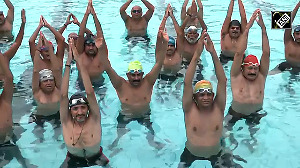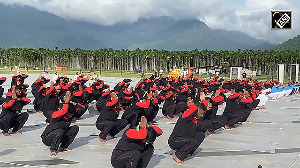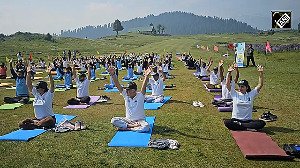It is depicted in some quarters in Asia as the coming together of India and Taiwan, with emphasis on learning from each other's growing soft and hardware portions of information technology.
That apart, as the cliché goes, the 'largest' and the 'latest' democracies in the world today, are quietly diversifying cooperation in several fields, but primarily in economic and technological areas.
Also, noteworthy is the growing consensus in the political landscapes of New Delhi and Taipei that such cooperation is in their mutual interests in the age of globalisation.
This is depicted in not only the growing bilateral trade which touched about $3 billion last year with nearly $500 million of Taiwanese investments in India but also to the growth in tourist influx from both capitals.
Interestingly, while India reportedly denied visa to the ruling Democratic Progressive Party chairman Yu Shyi-kun and chief of Taiwan-India Cooperation Council, the opposition Kuomintang ex-chairman and presidential candidate Ma Ying-jeou was in New Delhi promising to diversify Taiwanese cooperation with Indian businesses.
India also reportedly denied a visa a decade ago to the current President Chen Shui-bian when he was the Mayor of Taipei.
Incidentally, the KMT had mixed postures towards India with its former chairman Chiang Kai-shek visiting Delhi in 1942 and supporting Congress agitation against the British or a KMT delegation attending the Asian Relations Conference in 1947, while being politically close to Beijing on issues related to Arunachal Pradesh, or plainly indifferent to Indian request for an economic bailout package in 1991.
Apart from the reported meetings with certain mainstream political and business leaders, Ma Ying-jeou addressed a gathering at Indian Council for World Affairs at New Delhi on June 12- making it a KMT event after six decades at the same venue.
While emphasising expanding relations with India, which he said are 'old friends, exploring new opportunities', a major portion of his speech consisted, surprisingly, of tensions in Taiwan Straits - displaying internal political differences on a range of issues between the KMT and DPP.
First, while mentioning that about 900 short-range Chinese M-11 missiles (of Shaheen type) are targeting Taiwan, Ma mentioned that he would strive for promoting cross-Straits stability and discuss issues with Beijing.
In the backdrop of KMT leaders' visits to Beijing in the last two years, it appeared that the KMT would be taking into consideration Beijing's sensitivities in the foreign affairs arena, while the DPP has made it known in the recent period that independent political positions would be considered.
Secondly, while the KMT has underscored the increasing economic interdependence with China, reflected in the more than $250 billion of investments and more than $100 billion cross-Straits trade contributing significantly to the 'China rise', the DPP has launched 'go south' policy of exploring markets in Vietnam and other Southeast and South Asian countries.
Strangely, Ma appeared to be adopting such a 'go south' policy, given the imperatives of enhancing Taiwanese profits.
Thirdly, Ma was silent, or even evasive, on issues affecting India's relations with China, specifically on the border dispute or on Tibet.






